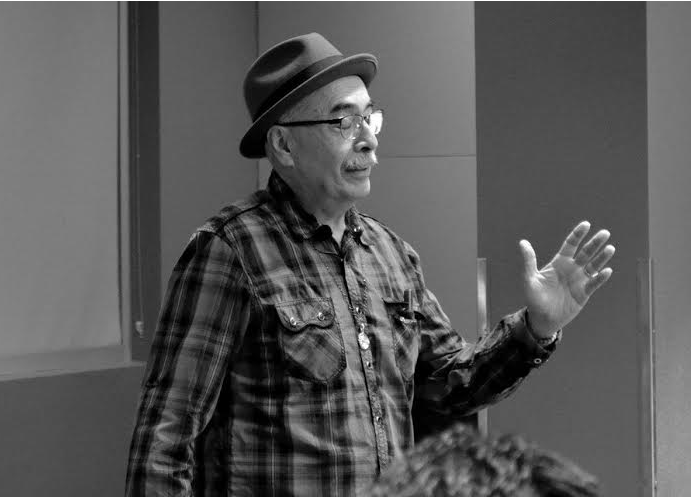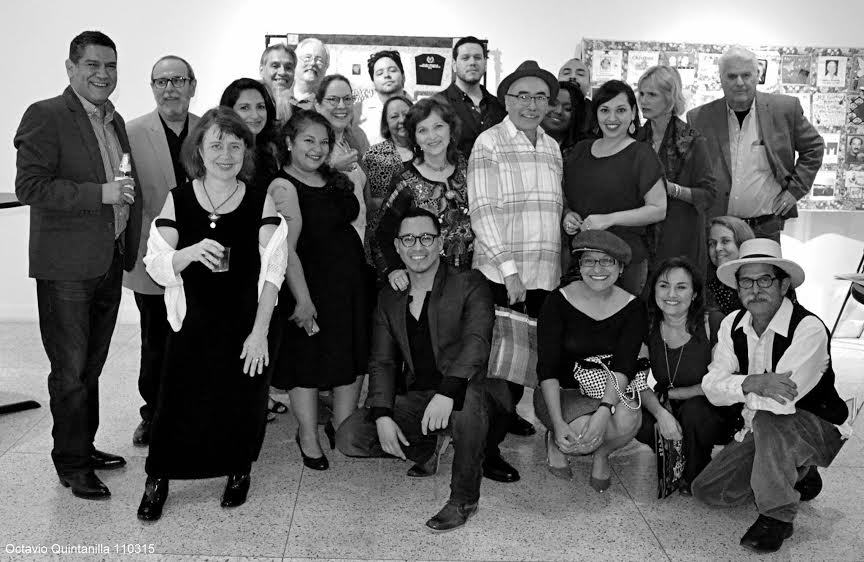
“I have a beautiful voice.”
*
The other day I was at a reading by U.S. Poet Laureate Juan Felipe Herrera at Palo Alto College on the Southside of San Antonio where I live. The Poet Laureate was standing before a room of students, some high school, some in community college. The room was slightly wary but also alert, and he was reading a poem, a poem about the flowering of all things, and then he stopped and he said: “I want to give you a gift today. Here it is,” and he paused and seemed to dance backward a little. And then he said, “Repeat after me—everyone, everyone: I have a beautiful voice.”
There were some nervous titters, and a few people half-heartedly said the words, and the Poet Laureate said, “Again,” and then he said, “Say it again. I have a beautiful voice.” And finally, everyone in the room repeated the words. And the Poet Laureate said, “It is very simple that idea, but it is the hardest thing in the world to believe.
*
I have a beautiful voice. Sometimes I think that being a writer or trying to be a writer is like suffering continuously through a low-grade case of the flu. You worry if you are good. You convince yourself you are good. You read over something you’ve written, or you read something someone else has written—something clever or beautiful or surprising—and you think maybe you are not so good after all. A couple of things I have observed—no one who is serious about writing ever entirely believes they are good or always good. Writing is deeply perverse. You can work very hard at it and get almost nowhere; at the same time, sometimes you toss off something that is at the very outer edge of what you can do with almost no effort at all.
*
The other day I was driving across town with a poet friend of mine. He is fairly young and usually projects an air of almost irrepressible confidence, though his poems are not confident at all but strange, dark, and vulnerable. Suddenly, in the middle of some remarks about his experience with his publisher, readings he’d done, he shook himself slightly and said, “So really, do you think I am any good?” and his voice cracked at the end, the way mine does, exactly the way mine does when I am asking just this question.
*
I have a beautiful voice. Except often I don’t
Sometimes I spend a Sunday piecing through old scraps of poems I’ve written. The ones that didn’t quite make it. I want these scraps to be better than they are. Because often they are bad, full of “dark” and “dream” and practically gloopy feelings. Not quite the level of “happiness is a warm puppy” or “sorrow is a needle in my heart” but close. And yet, and yet, if you are a writer you never entirely give up the ghost. I have a beautiful voice. And somehow I will trick it into coming out.
*
James Tate—the late great James Tate said this about writing a poem:
I know I am not alone when I confess that I have stared at a blank sheet of paper for hours, day after day. Why? Why is it so difficult? Because I want to travel to a new place. Not only do I want the language to be new, I also want the ideas to be new. I want the whole world to be new! We know that that is impossible, but desire is not rational….
The poem is like a very demanding but beautiful pet. It says, “I want this. No, I don’t want that. Now I need this, and more of that. But I don’t want any of that,” and so on. Corrective moves. Wanting both truth and beauty, the beauty of language in pursuit of truth.
I once met Mr. Tate. It was 1985. Reagan was delivering the first State of the Union of his second term on the television set above the bar of the café where we sat… Was I ever so young? The publishing company I worked for had hired Tate to edit a collection of poems for children. I was along as the editorial assistant: My first business trip. I was an awkward young person who loved writing with a queer and dislocating passion, though I didn’t even call myself a writer then—but James Tate, I knew him, often reciting lines from “The Lost Pilot” under my breath: “My head cocked against the sky/I cannot get off the ground.”
We ordered vodka and tonics, which seemed louche and daring to me—it was only 2 in the afternoon, and he moved like a man in a fog, with great precision and a kind of wariness, which seemed odd in someone who was not then so old. But then he spoke of his wife at the time—I think she was Swedish or from some northern place—and his way of describing her gave me a sudden courage, so that I began bombarding him with questions about poetry.
Was it hard? Why was it so hard? How did you know if what you were writing was good? How do you begin?
He answered as best he could. He said you could not have any kind of plan. He said you would never know anything for sure. He said in fact the most difficult thing was the enforced idleness—he lifted his glass, “that necessary indolence,” he said or something like that. I thought he was being hip, and I laughed, but now I know he was just speaking the truth.
*
Cruel fact: when it comes to writing, more work does not mean a better product. Cruel fact: when it comes to writing, having a plan or a purpose is almost the very worst thing you can do.
Gertrude Stein said it like this: “you will write… if you will write without thinking of the result in terms of a result, but think of the writing in terms of discovery, which is to say that creation must take place between the pen and the paper, not before in a thought or afterwards in a recasting…”
Writers have a million different strategies for dealing with this. Most of these have to do with devising methods of working that somehow do not feel like work.
*
I have a friend, Louis, who keeps a daily journal and has for years. Just notes from the everyday. When he tired of what he is writing, he pulls from the preferably not too close past. He pulls out one of these many notebooks and randomly selects phrases. He focuses on some small section of his past, a period from which he usually claims to remember not all that much.
“What kind of name is Dr. Dre?”
“She was bored by the Picasso exhibit, Lydia said.”
“That white gazpacho Clovis made was terrific! Get L. to get that recipe.”
He will write. He feels as if he is on a subterranean journey though the world as it is, yet distanced and made strange by his faulty memory and these real words, which he recovers traced on the page, no longer part of a narrative he knows.
Another friend, a woman I’ll call K, writes her poems by eavesdropping assiduously. It helps that she lives in a large city where it is possible to overhear both the most vivid banality and also the dread secrets of lives, a city where people exist cheek-to-jowl but are practiced in the art of pretending not to notice.
She sits in a café or on a park bench, and she simply writes down word for word, or as close as she can get, whatever scraps of conversation float her away.
“Get away from that thing!”
“Are you born into this foolishness or what?”
“I know now what it feels like to wake up and be a person who has lost everything they ever owned in a stupid apartment fire.”
Out of this, she crafts elusive lyrics in which the scaffolding of what was said is all but gone; yet she claims she needs that touch of the real. These words people said when they were not thinking.
*
In times when the muse feels distant and opaque—those flu-ey hours when nothing I write or can imagine writing feels new or fresh enough, there are a few writing exercises that have helped me. One of the best—gifted to me by the poet Carrie Fountain—is so simple it sounds idiotic, but it works. Here it is: Take a sheet of blank paper and fill it. One page, beginning to end with anything at all, even just one word.
Another is simply to read something and copy its structure or simply respond to it. A text I have used often, again from my friend Louis, is a letter Vincent Van Gogh wrote to his brother, Theo. I will quote just a part of it:
Painters — to speak only of them — being dead and buried, speak to a following generation or to several following generations through their works. Is that all, or is there more, even? In the life of the painter, death may perhaps not be the most difficult thing.
For myself, I declare I don’t know anything about it. But the sight of the stars always makes me dream in as simple a way as the black spots on the map, representing towns and villages, make me dream.
Why, I say to myself, should the spots of light in the firmament be less accessible to us than the black spots on the map of France?
Just as we take the train to go to Tarascon or Rouen, we take death to go to a star. What’s certainly true in this argument is that while alive, we cannot go to a star, any more than once dead we’d be able to take the train. So it seems to me not impossible that cholera, the stone, consumption, cancer are celestial means of locomotion, just as steamboats, omnibuses and the railway are terrestrial ones….
Ah, Van Gogh!. What letter was ever more trenchant and beautiful? There is a story I love about Georgia O’Keefe when she lived in West Texas. Every evening, she and her sister would walk out into the plains. Her sister would shoot at tin cans set up on fences while Georgia stargazed. Georgia said there was one star that shone with a peculiarly bright and watery light. “I got six paintings from that star,” she said. I have gotten perhaps six poems from this letter of Van Gogh’s. Why does it grip me so? Because it thinks of ordinary things—things around us like air—in a way that feels utterly radical and also liberating. Yes, the stars are far away. Yes, there is the fact of that distance and that it is uncrossable, but perhaps not or not so much as we might think.

*
At the end of his reading at Palo Alto College, someone asked the Poet Laureate Juan Felipe Herrera how he felt when he learned he had been named the first Latino U.S. Poet Laureate. Herrera hesitated a moment. “I thought about that whole beautiful voice thing,” he said. “It was heavy, like a wave.” His hands swept across his torso as if illustrating a flame passing down through his chest.
“That’s how deep it goes,” he said.
I have a beautiful voice.
The dead reach the stars.